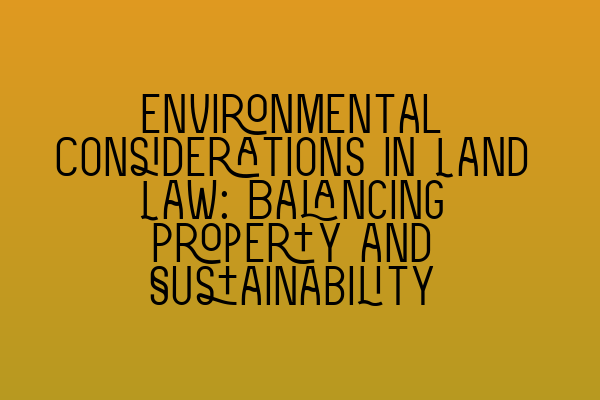Environmental Considerations in Land Law: Balancing Property and Sustainability
In today’s rapidly changing world, the integration of environmental considerations in land law is of paramount importance. As society becomes increasingly aware of the environmental consequences of our actions, it is crucial for property lawyers to navigate the delicate balance between property rights and sustainability. This blog post will explore the challenges faced by legal professionals and the key environmental considerations that must be taken into account to ensure a harmonious future for both property owners and the planet.
One of the fundamental challenges in land law is striking a balance between the rights of individuals to enjoy and use their property and the need to protect the environment. While property rights are essential in providing individuals with security and autonomy, they must not come at the expense of the natural world. This dilemma requires legal professionals to consider innovative approaches that promote sustainable land use and minimize ecological harm.
One key aspect of environmental considerations in land law is the concept of sustainable development. Sustainable development seeks to meet the needs of the present generation without compromising the ability of future generations to meet their own needs. In the context of land law, this means finding ways to use and develop property that minimize negative environmental impacts, while maximizing long-term benefits.
To achieve sustainable development, property lawyers must consider a range of environmental factors when advising clients. These factors include the ecological impact of proposed land use, the conservation of natural resources, waste management, air and water pollution, and the preservation of biodiversity. By integrating these considerations into the legal framework, lawyers can ensure that development projects are both environmentally responsible and legally compliant.
One tool that property lawyers use to achieve this balance is the Environmental Impact Assessment (EIA). An EIA is a systematic process that helps identify, assess, and mitigate the environmental impacts of proposed developments. It takes into account factors such as the potential for habitat destruction, air and water pollution, and the impact on vulnerable ecosystems. By conducting an EIA, property lawyers can guide their clients towards sustainable development practices that minimize environmental harm.
Furthermore, property lawyers play a crucial role in negotiating and drafting agreements that promote sustainable land use. These agreements may include provisions for renewable energy installations, water conservation measures, and the protection of natural habitats. By incorporating these considerations into legal agreements, lawyers can ensure that property owners are accountable for their environmental impact while creating incentives for sustainable practices.
In addition to promoting sustainable development, property lawyers also have a responsibility to address environmental issues that arise from historical land uses. Contaminated land, for example, poses significant challenges to environmental sustainability. Property lawyers must navigate complex legislation, such as the Environmental Protection Act 1990 in the UK, to ensure that contaminated sites are remediated and made safe for future use.
By highlighting the importance of environmental considerations in land law, we hope to encourage legal professionals to proactively address sustainability concerns when advising clients. Sustainable land use practices not only protect our planet but also contribute to the long-term value of properties. As society becomes more environmentally conscious, potential buyers and investors are increasingly seeking properties that meet high environmental standards. By integrating sustainable practices into land law, lawyers can not only protect the environment but also enhance the legal value of properties.
In conclusion, environmental considerations are integral to the practice of land law. Legal professionals must strike a delicate balance between property rights and sustainability to ensure the well-being of both property owners and the planet. By incorporating sustainable development practices, conducting environmental impact assessments, and negotiating environmentally responsible agreements, property lawyers can contribute to a more sustainable future. Let us embrace the challenges and opportunities that come with integrating environmental considerations into land law to create a harmonious balance between property and sustainability.
Related Articles:
– SQE 1 Practice Exam Questions
– SQE 1 Practice Mocks FLK1 FLK2
– SQE 2 Preparation Courses
– SQE 1 Preparation Courses
– SRA SQE Exam Dates
